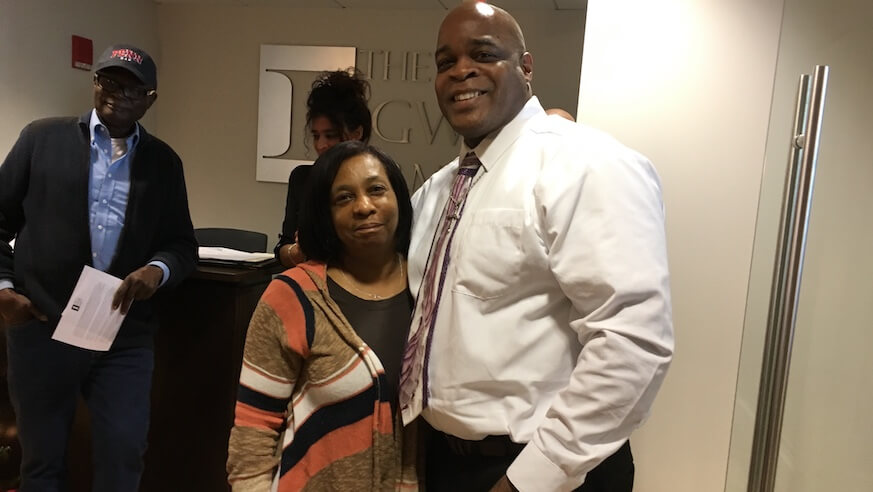Elmer Daniels was 18 when he was arrested for a rape in Wilmington, Delaware, in January 1980. He walked out of prison last week at age 59, after lawyers uncovered problems with the case so serious — and including links to an FBI crime lab scandal affecting thousands of cases the bureau is reviewing — that a judge dismissed the indictment.
Despite having missed the last four decades of life on the outside, Daniels said he is just happy to be free and with his girlfriend in time for the holidays.
“They took something that they can never give me back,” Daniels said Tuesday during a press conference at his lawyer’s office. “At 18, where were you? Where are you now? I can’t identify with any of that. … But hey, I forgive you. Because that’s not for you. It’s for me.”
Less forgiving was Daniels’ team — including his lawyer, Emeke Igwe, managing attorney of the Igwe Firm in Center City, Philadelphia; investigator Terrance Johnson, and Delaware attorney Herbert Mondros.
“He’s not getting off on a technicality, he’s getting off because he’s actually innocent,” Igwe said. “It was not flawed testimony, it was false testimony.”
As Igwe described it, Daniels’ arrest and prosecution was an avalanche of errors that went unnoticed for decades.
Daniels, an African-American, was fingered as the suspect who raped a white 15-year-old girl by train tracks near Lovering Avenue and Augustine Cutoff in Wilmington by the white 15-year-old teenage boy who was with her and said the suspect chased him away. The boy — whom Igwe contends had been intoxicated, gave conflicting accounts to police, and was ultimately threatened by police with being charged himself with the rape — claimed the rapist was “Elmer,” whom he knew from his 8th-grade math class.
It wasn’t until Igwe reinvestigated the case and pulled school records that anyone examined this claim — and records show Daniels was in 10th grade at Wilmington High School, while the witness was in eighth grade at Bayard Middle School.
Daniels had an alibi — that he was playing basketball a mile away at Latin American Community Center — and witnesses backed him up at trial.
There was also fingerprint evidene that didn’t match up. And even a court-appointed psychiatrist made an off-topic observation in their report that Daniels did not match the physical description of the suspect in the court file — his fingernails were well-manicured, while the suspect’s were described by the victim as being bitten down to the cuticles.
But none of that saved him. As egregious as these flaws may seem, the prosecution had a powerful ally: the FBI.
Court records show FBI special agent Michael P. Malone reviewed evidence from the rape and claimed to identify Daniels using “microscopic hair analysis” — not DNA, but visually comparing hairs, a method the FBI has since acknowledged was problematic. At Daniels’ trial, Malone claimed he had a “double match” — that he found Daniels’ hair on the victim’s underwear, and her hair on his pants. But a copy of an FBI letter from 2017 said in Daniels’ case that Malone’s hair comparison “exceeds the limits of science.”
In 2015, the FBI said it is “working with the Innocence Project to address errors made in statements by FBI examiners prior to December 1999 regarding microscopic hair analysis in the context of testimony or laboratory reports” and is “committed to ensuring that affected defendants are notified of past errors and that justice is done in every instance.” That review is ongoing. Since 1996, the FBI has relied more extensively on DNA evidence testing.
“One can hardly blame the jury for convicting Mr. Daniels based on the false scientific evidence,” Igwe acknowledged.
The Delaware Department of Justice was notified in January 2018 that the Daniels case was among the roughly 2,500 cases under review for links to Malone and junk science at the FBI crime lab – some of which led to defendants being put to death. The state offered a commutation and then a pardon, before the office of Delaware Attorney General moved for the dismissal of the indictment against Daniels based on various evidentiary issues. However, they withheld declaring that Daniels was evident, citing the victim’s positive identification of Daniels as her rapist based on his photograph, after reviewing 250 photos. (The victim could not be reached for comment on Daniels’ release). On Dec. 12, Daniels’ 57th birthday, a judge dismissed the indictment against him, leading to his release.
In the days since, Daniels said he has been seeing old family members and adjusting to cellphones and Siri in 2018, while trying to work out necessities like obtaining insulin for his diabetes (cut off from prison medical support, Daniels had to go to the emergency room on Dec. 17 to get insulin, his team said).
“I’m furious, I’m upset, I’m angry,” said investigator Terence Jones, who worked on the case for Igwe. “It’s painfully obvious that Elmer Daniels is an innocent man and was wrongfully convicted.”
Ironically, Daniels had been paroled from his life sentence back in 2016 when he crossed paths with Igwe at a legal clinic. But he wound up thrown back inside for failing to meet two conditions of his parole. While he got a job at a pizza parlor, he lost it after local police ordered the shop to post flyers warning customers that Daniels was a “sex offender” due to his rape conviction. As for the other condition, of admitting his guilt — Daniels refused, as he has steadfastly maintained his innocence since 1980.
“It’s a case of destiny. Me and Mr. Daniels, our paths were destined to meet,” Igwe said. I believe that part of my mission on earth was to meet with Mr. Daniels and prove that he was innocent. If we didn’t cross paths, Mr. Daniels would have died in jail and been buried in an unmarked grave.”
Igwe and Daniels are in the early stage of a likely lawsuit over his time in prison, but in the meantime are planning to create a nonprofit criminal justice reform foundation, called Absolute Justice.
“My thoughts about that is, now, I’m home, and so the work, the real work, is just beginning,” Daniels said. “There’s a lot of men in prison like me.”



























